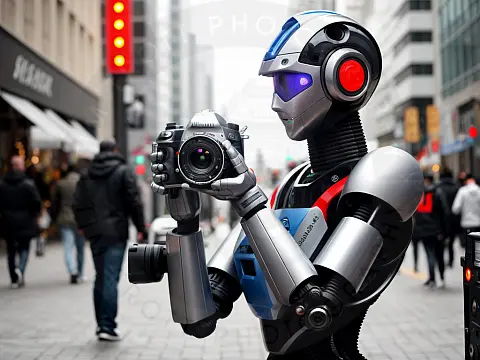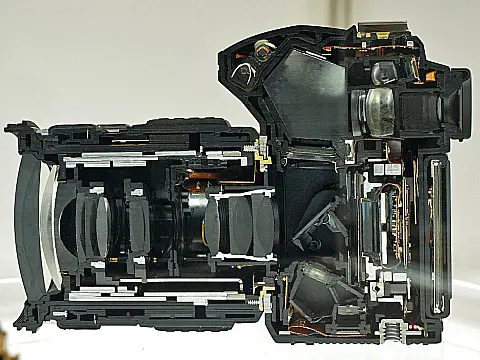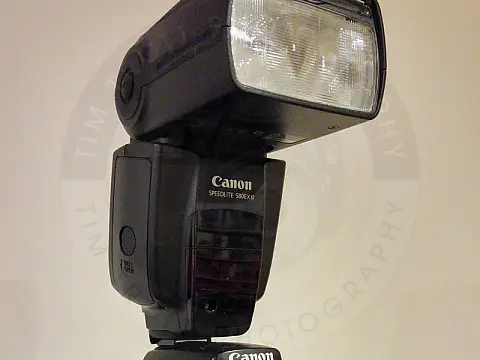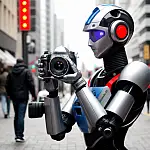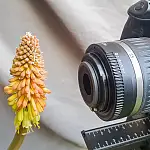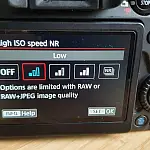The Future of Photography: AI-Powered Cameras and Editing ToolsDiscover how AI is transforming the photography industry and shaping its future. Explore the exciting possibilities and advancements in this guide!
Artificial intelligence (AI) is transforming the photography industry, bringing about substantial changes and developments. AI is revolutionising the way photographers shoot, edit, and share their work, from automated editing tools to intelligent image identification. In this article, we will look at the fascinating possibilities and examine how artificial intelligence is impacting the future of photography.
The Role of AI in Photography
In the world of photography, AI technology has already achieved tremendous advances. Photographers can now obtain beautiful results with less work thanks to automated editing tools and AI-powered cameras. However, whether AI will entirely replace photographers remains to be seen. While AI can potentially improve and streamline certain areas of the photography process, such as image editing and organisation, it is unlikely to replace photographers' creative eye and artistic vision. Finally, AI should be viewed as a tool to supplement and aid photographers, rather than as a replacement for their skills and knowledge.
AI-Powered Image Recognition and Tagging
Image recognition and tagging are two of the most significant advances in photography brought about by AI. Cameras and editing software can now recognise and tag objects, people, and scenes in images using AI-powered algorithms. Not only does this save photographers time and effort in manually tagging their shots, but it also provides for better photo organisation and searchability. AI can effectively detect and categorise various features in a photograph, making it easier for photographers to locate specific images in their large collections. This technology is transforming how photographers manage and organise their work, making it more effective and streamlined.
Automated Editing and Retouching
Photographers can now use AI-powered software to automate chores like colour correction, exposure changes, and even skin retouching. This not only saves photographers time and effort but also ensures consistent and high-quality outcomes. AI systems can analyse and comprehend image material, allowing for intelligent and precise modifications. This technology has increased the accessibility of editing and retouching to photographers of all skill levels, as well as opening up new avenues for creative expression in the industry.
Enhanced Image Search and Organization
In the photography industry, AI technology has considerably enhanced image search and organisation. Photographers can now simply search for certain photographs based on keywords, colours, or even specific objects inside the image using AI-powered algorithms. This makes it much easier to search and organise enormous photo collections. AI can also classify and categorise photographs automatically, saving photographers time and effort. Furthermore, AI can analyse an image's content and recommend suitable tags or keywords, greatly easing the organisation process. Overall, AI has improved the efficiency and convenience with which photographers look for and organise their photos.
Real-Time Image Analysis and Optimization
The capacity of AI to undertake real-time image analysis and optimisation is one of the most exciting breakthroughs in the photography industry. Photographers can now immediately enhance and optimise their photographs using AI algorithms with a few clicks. To create the perfect image, AI can automatically adjust lighting, colour balance, and sharpness. This not only saves photographers time when it comes to post-processing, but it also assures that each photo looks its best. AI can even analyse an image's composition and recommend cropping or frame changes to improve the overall beauty. Photographers can now produce professional-quality images with ease thanks to real-time image analysis and optimisation.
AI-Generated Content and Personalized Recommendations
The photography industry is being transformed by AI-generated content and personalised recommendations. Photographers may now generate unique and customised material based on individual tastes and interests using AI algorithms. AI can analyse data from social media platforms, online galleries, and user behaviour to determine which types of photographs and styles are popular with various audiences. Photographers can now tailor their material to specific target markets, increasing engagement and reach. Furthermore, AI-powered recommendation systems can promote relevant content to users based on their browsing history and preferences, assisting photographers in gaining visibility and attracting new followers. AI is shaping the future of photography, providing limitless opportunities for creativity and innovation.
Advantages and Disadvantages of AI in Photography
The use of artificial intelligence in photography has both advantages and disadvantages. On the plus side, artificial intelligence technologies may automate repetitive processes like image editing and organisation, saving photographers important time and effort. AI-powered cameras can also help you get the perfect photo by analysing the scene and altering settings as needed. Furthermore, AI systems can assist photographers in improving their photographs by recommending changes and adjustments based on industry patterns and trends.
However, there may be disadvantages to leaning too heavily on AI in photography. One source of concern is the loss of photographers' human touch and artistic intuition. AI algorithms may be able to copy some styles and approaches, but they may fail to recreate photographers' unique perspectives and artistic vision. Another source of concern is that AI can perpetuate biases and stereotypes since algorithms are trained on current data that may have inherent biases.
The future of photography will very certainly contain a balance of AI technology and human ingenuity. While artificial intelligence will likely improve certain areas of the photographic process, photographers will continue to play an important role in capturing emotion, telling stories, and pushing the boundaries of the art form.
Can AI Truly Replace the Human Touch?
The question of whether AI can completely replace the human touch in photography is complicated. While artificial intelligence technology has improved tremendously in recent years, many parts of photography may be challenging for computers to mimic. Photographers thrive in the creative element, which includes capturing emotion, telling a story, and pushing the boundaries of the art form.

Photographers add their unique points of view and artistic vision to their work, which is often influenced by their experiences, emotions, and personal style. This human touch is what distinguishes their images and allows them to connect with viewers on a deeper level. In contrast, AI algorithms are educated on existing data and patterns, which may limit their ability to capture the same level of originality and emotion.
Photography is more than merely capturing a technically perfect image. It is about connecting with the subject, learning their story, and creating a visually appealing image employing composition, lighting, and timing. These are abilities that require human intuition and empathy, which AI may struggle to imitate.
While artificial intelligence (AI) technology can certainly help photographers with chores like image editing and organisation, it is unlikely to replace the need for human photographers. The future of photography will almost certainly involve a collaboration between artificial intelligence and human creativity, with photographers adopting AI technologies to improve their work and push the boundaries of what is possible.
AI-Assisted Photography - Enhancing the Photographer's Skills
The emergence of AI technology has generated debate about whether algorithms may eventually replace photographers. Instead of replacing photographers, AI has the potential to improve their talents and push the limits of what is possible in photography.
Photographers can use AI to help them with chores like image editing and organisation, allowing them to streamline their workflow and focus more on the creative aspects of their work. AI systems can analyse enormous amounts of data and trends to recommend photo modifications or upgrades, saving photographers time and effort.
AI can assist photographers with image identification and object detection, making it easier to take the right shot. AI technologies, for example, can detect and monitor subjects in real-time, guaranteeing that photographers never miss a critical moment.
Artificial intelligence (AI) can be utilised to create new and distinctive visual effects, allowing photographers to explore and push the boundaries of their craft. Photographers can experiment with new styles, techniques, and viewpoints by utilising AI tools, resulting in visually appealing and original photos.
How Photographers Can Adapt to AI Technology
As AI technology advances, photographers must adapt and embrace the possible benefits. Photographers can adapt by introducing artificial intelligence (AI) tools into their process. Photographers can save time and focus more on the creative parts of their work by adopting AI algorithms for activities such as image editing and organisation. Photographers can also experiment with new artistic effects and styles by utilising AI's capacity to generate distinctive visual features. However, photographers must understand that AI is not a replacement for their creativity and emotional connection with their subjects. Photographers may improve their skills and make visually attractive and emotionally engaging photos in the future by adopting AI as a tool.
